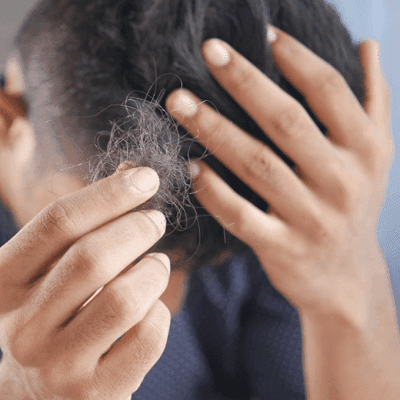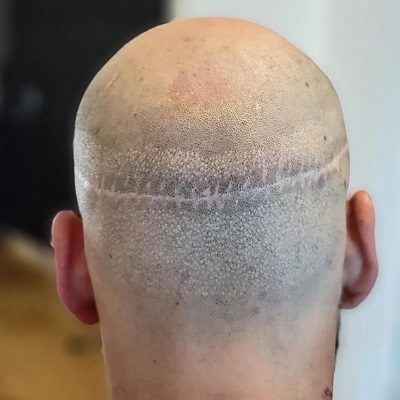
Introduction:
It may seem impossible to break out of the damaging self-esteem loop that many mental health issues can produce. Can depression lead to hair loss, then? If so, what steps may be taken to lessen depression’s effects and slow down or stop hair loss?
Healthy knowledge is that stress and mental health issues like depression and anxiety can cause hair loss.
The effects of hair loss on your mental health, much as sadness, worry, and stress can affect the growth of your hair. Since losing one’s hair can be a distressing experience for many people, hair loss can cause a decline in self-esteem, feelings of attractiveness or success, and even post-traumatic stress disorder.
Particularly for women, identity, femininity, and sexuality are strongly correlated with hair. According to one study, “approximately 63 percent of women with alopecia claim to have had career-related problems,” and “about 40 percent of women with alopecia have had marital troubles as a result.” Compared to women who don’t lose their hair, these women are more prone to anxiety and sadness.
Managing hair loss:
Thankfully, you have many options for managing hair loss like hair transplant in Dubai, medication, PRP in Dubai, mesotherapy, scalp reduction, and laser therapy.
Some techniques are used to manage hair loss, and their psychological impacts are discussed briefly. Just a few of them are as follows:
Consult a doctor:
It is well-recognized that mental health disorders, such as stress, can occasionally result in hair loss. Still, it is also crucial to rule out any physical health conditions that might be causing over shedding. According to the American Academy of Dermatology Association, psoriasis of the scalp, some sexually transmitted infections, deficiencies in specific nutrients, and thyroid-related conditions can all cause hair loss. These are only a handful of the causes that could prevent a healthy hair growth cycle. Additionally, hair loss is frequently multifactorial. It is advised to schedule a consultation with your doctor to talk about any potential health issues, as they may extend beyond hair loss caused by genetics or the natural aging process.
Talk to a reliable stylist:
Many hair stylists have received specialized training in finding solutions for clients wanting to conceal hair loss symptoms. Your hair can be cut or styled by a stylist to conceal thinning patches on the scalp or receding hairlines, and they can also suggest products that might make it look like you have more hair than you have. You can manage your hair with colored powders, shampoos, and gels that add volume, or even a natural hair extension or wig.
Speak with someone:
You might want to think about speaking with a therapist about hair loss if it interferes with your essential relationships or your feelings of self-worth or self-esteem. The ideal therapist will offer a sympathetic ear and support you as you go through any emotions that hair loss may be triggering in you. A therapist is prepared to assist you in addressing this issue if stress or anxiety appears to be the reason for hair loss. While few therapists have a specific area of expertise in hair loss-related disorders, many have experience with body image issues, anxiety, and self-esteem problems.
Keep in mind that it could cause regrowth:
Hair loss brought on by shock or stress is often a transient ailment. Temporary hair loss can also be brought on by some drugs, chemotherapy, radiation, pregnancy, and weight loss. To find out if this might affect your hair’s health, it is advised to schedule a visit with your doctor. Remember that many of these conditions are transient, and your body may regain the capacity to generate hair the way it once did.
Does depression lead to hair loss?
There is not much research on the subject of depression and hair loss. However, a 2012 study among adult female outpatients found that hair loss complaints are frequently correlated with depressive symptoms.
Hair fall isn’t a primary sign of depression but rather a secondary symptom brought on by its causes or treatments.
There appears to be a stronger connection between depression and hair loss in people who are also stressed. Baldness, on the other hand, can also cause depression symptoms.
Although an initial stressor may initially cause depression and hair loss, hair loss itself can create significant stress on its own and may lead to a constant negative loop between stress, sadness, and hair loss.
Depression-related hair loss—can it come back?
Depression-related hair loss might not endure permanently, especially if your hair follicles are still in good health.
If your depression symptoms go away and your stress levels drop, your hair may start to come back. If drug use is the cause of hair loss, average hair growth will probably resume after the medicine is stopped.
Halting Hair Loss:
Several strategies prevent your hair loss from worsening if you’ve discovered that it’s higher than usual. Avoid wearing your hair in tight styles that could drag on the scalp and harm the follicles, and make sure you’re getting the necessary nutrients and controlling your stress levels. Reduce the chemicals you use on your hair, and use heat styling tools, bleach, and hair dyes sparingly. Reduce the frequency of shampoo use, which can deplete the hair of vital oils, to maintain the health of your scalp. Instead, rub coconut oil into the scalp because a 2015 study found that it can encourage hair growth. Lastly, think about ingesting a natural hair supplement with components that encourage a healthy hair development cycle from the inside out.
Get a Consultation!
The first step in receiving hair loss treatment in Dubai is to go to a professional. Your questions will be answered during this session. To receive awe-inspiring results from a treatment, however, you should also be sure to choose a surgeon who has been well-trained. In any case, you can always get in touch with us.


































